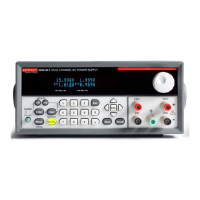Commands Listed in Alphabetical Order
*ESE might retu
rn the string
*ESE 186, showing that the ESER contains the
binary value 10111010.
*ESR? (Query Only)
Returns the contents of the Standard Event Status Register (SESR). *ESR? also
clears the SESR (since reading the SESR clears it). (See page 3-1, Status and
Events.)
Group
Status
Syntax
*ESR?
Related Commands
*CLS, *OPC, *SRE,
Returns
<NR1>, which is a decimal representation of the contents of the Standard Event
Status Register (SESR).
Examples
*ESR? might return the value 149, showing that the SESR contains binary
10010101.
FETCh[:SCAL
ar]:CURRent[:DC]? (Query Only)
This command returns the last measured output current stored in the
communications buffer of the power supply. A new measurement is n ot initiated
by this comm
and.
CAUTION. Using this FETCh command may return an old result, which could
adversely affect the accuracy of your test. In most cases, using the MEASure
command is recommended. The benefit of the FETCh command is that it provides
a result a bit more quickly than the MEASure command.
Group
Measurement
Syntax
FETCh[:SCALar]:CURRent[:DC]? [CH1|CH2|CH3|ALL]
Related Commands
MEASure[:SCALar]:POWer[:DC]?
Series 2200 Programmable Multichannel DC Power Supplies Programmer Manual 2-15

